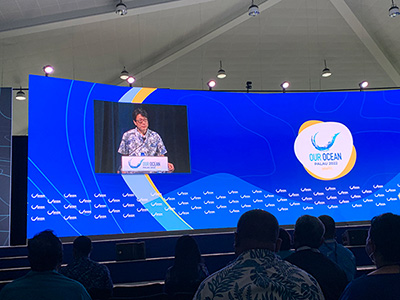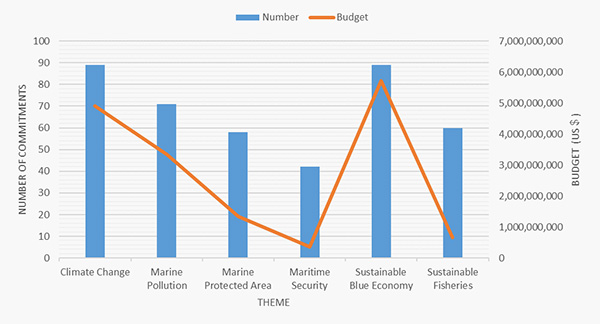Ocean Newsletter
No.530 September 5, 2022
-
Expectations Towards Floating Offshore Wind
ODA Yoichi (Coordinator, Organization for Marine Science and Technology, Nagasaki University)
Japan, with its expansive bodies of ocean, has the highest potential for generating offshore wind in Asia. It’s estimated that even wind farms within 60 km from the coastline have the potential to generate 2.25 million gigawatt hours per year (2,253 billion kilowatt hours per year) of energy, which is more than twice the total electricity demand in Japan. Mankind needs an immediate and large-scale response to the climate change crisis. We believe that Japan should actively pursue offshore wind, leading us to shift away from fossil fuels and improve energy self-sufficiency.
-
The Commitments at Our Ocean Conference: Their Significance and Issues
WATANABE Atsushi (Senior Research Fellow, Ocean Policy Research Institute, The Sasakawa Peace Foundation)
This article looks at the notable points from the Our Ocean Conference, a high-level international conference regarding ocean sustainability, and will explain what its commitments are as well as how their transparency can be ensured and increase its impact.
-
How the Tidal Flats of Ariake Sea Unite High School Students’ Environmental Conservation Activities
SUZUKI Hironori (Secretariat, Mori-Sato-Umi Forum / Organizer, Inter-Ariake Sea High School Summit)
In March 2022, we held the Inter-Ariake Sea High School Summit, a gathering for high school students who share ties to the tidal flats of Ariake Sea. Two institutions and four schools came together for presentations on environmental conservation activities by high school students and had discussions on tidal flats, providing an opportunity to foster connections that transcend generations and take a step toward the future.
The Commitments at Our Ocean Conference: Their Significance and Issues
[KEYWORDS] Commitments/Palau/Ocean SustainabilityWATANABE Atsushi
Senior Research Fellow, Ocean Policy Research Institute, The Sasakawa Peace Foundation
This article looks at the notable points from the Our Ocean Conference, a high-level international conference regarding ocean sustainability, and will explain what its commitments are as well as how their transparency can be ensured and increase its impact.
Ocean international conference and commitments
 Mr. Kozo YOSHIDA, Deputy Director General of the National Ocean Policy Secretariat, Cabinet Office of Japan, announcing the commitments from the Government of Japan.
Mr. Kozo YOSHIDA, Deputy Director General of the National Ocean Policy Secretariat, Cabinet Office of Japan, announcing the commitments from the Government of Japan.
In addition to state commitments via legally-binding international agreements, the practice of declaring voluntary commitments through international policy discussions relating to sustainability has in recent years become mainstream. In a forum where many stakeholders share the same space and its influence spreads beyond that space, just like the ocean, many interested parties, including of course states but also NGOs, civic organizations, private-sector companies, and youth groups, must avoid frustrating each other and instead join hands and cooperate toward sustainable usage. Declaring commitments breaks down barriers between fields, lowers the threshold for cooperation, and creates anticipation that everyone will buy into taking action as their own issue.
The main international conference for presenting commitments regarding the ocean is the Our Ocean Conference (OOC), which was launched in 2014 under the leadership of the then-United States Secretary of State John Kerry. On April 13 and 14, 2022, the 7th OOC*1 was held in Palau. Through the seven Conferences to date, a total of more than 1,800 commitments worth 108.0 billion U.S. dollars has been made across seven fields, focusing on six thematic areas: climate change, sustainable blue economies, sustainable fisheries, marine protected areas, marine pollution, and maritime security, and a pledge to host the OOC.
Features of the commitments at the Palau Conference
This section will consider the features of the commitments made at the 7th OOC in Palau, with which the Ocean Policy Research Institute together with the Nippon Foundation has been collaborating since 2020, working toward the Palau Conference. At the Conference, 411 commitments were declared, reaching a total value of 16.35 billion U.S. dollars. The total value was the second highest ever after the 2019 Norway Conference, with the number of commitments also the second highest ever, following the 2017 Malta Conference. In terms of themes, the number of commitments about climate change and sustainable blue economies were both high at around 20%, showing a high degree of awareness about these fields. Commitments regarding maritime security were also around 10%, a little higher than previous conferences.
These statistical trends are likely not unrelated to this OOC being the first held on a small island developing state. Small island developing states, which perceive climate change to be the greatest threat facing them, place great importance on climate change countermeasures utilizing nature and how they relate to the regeneration of nature. In addition, the decarbonization of the shipping sector through initiatives such as Green Shipping Corridors*2 and the Clydebank Declaration (2021)*3 by developed countries, measures to increase the sustainability of the tourism sector (which has suffered severe damage from the COVID-19 pandemic), and initiatives to increase the resilience of coastal residents by balancing resource utilization and preservation in coastal areas were frequent commitments in the field of creating sustainable blue economies. In terms of achieving a safe, just and secure ocean, many commitments were made in fields necessary in the region, including upgrading maritime safety functions, measures against fisheries-related crimes, as well as illegal, unreported and unregulated (IUU) fishing, which are issues for island states.
In terms of the bodies pledging commitments at this Conference, the United States was the clear leader at 111, the next being the EU at 44, Japan at 35, Taiwan at 21, and Norway at 20. Compared to past Conferences, the proportion of commitments from governmental agencies has risen from 59% to 65%, with private-sector pledges decreasing from 10% to 3%. Detailed analysis is necessary moving forward to identify the causes for the decline, but one possible reason is that private-sector companies have been hesitant to participate in face-to-face meetings, which were hosted in an opaque manner during the COVID-19 pandemic.
OOC commitments are lodged by the respective organizations on a registry website, where they are peer-reviewed by the host, who either requests modifications, rejects them, or approves them. Approved commitments are ultimately published in the registry and released on the internet. The hosts this time are the officials from the Government of Palau and specialists from research institutes in Palau. The Ocean Policy Research Institute had also been involved in advancing work, but since the change of governments in both the United States and Palau in 2021, officials from the U.S. Department of State have been added to the hosts and engaged in the screening work. Budgetary allocations were naturally key aspects of the screening, but the emphasis will be on whether the commitment is innovative, has a large impact, and can have a broader effect, and whether it is a simple extension or makeover of a previously presented commitment. In addition, the Ocean Policy Research Institute registered three commitments in the field of the blue economy, including blue carbon, as well as one commitment regarding sustainable fisheries which were approved.
 ■Figure: Number of commitments and budgetary scale at the 7th OOC regarding the six major thematic areas (created by the author)
■Figure: Number of commitments and budgetary scale at the 7th OOC regarding the six major thematic areas (created by the author)
Commitment system issues and improvements
As this article has shown so far, the importance of voluntary commitments at international conferences discussing the sustainable use of the ocean has increased in recent years. However, the practice also faces many issues, the most serious of which is the lack of structures within conference processes to share information about good practices or impacts of commitments pledged in the past as well as causes of failures and measures necessary to resolve them. These issues have already been indicated by researchers overseas, with evaluation conducted regarding the two themes of marine protected areas and sustainable fisheries in terms of whether OOC commitments are empty promises or do in fact bring about meaningful progress. Regarding marine protected areas commitments, it was pointed out that improvement was necessary in terms of clarity and traceability of pledges and facilitate monitoring results. Similarly, for sustainable fisheries, while the commitments made were broadly rated as feasible, it was pointed out that more emphasis should be placed on documenting their effects for evaluation in order to increase the transparency and effectiveness of the pledges made.
The state of achievement needs to be evaluated similarly for the other four themes, and feed this back to past and future OOC hosts. In addition, those screening the commitments registered are required to have the expertise to objectively evaluate the overlap of past commitments registered at the OOC, as well as global trends, new developments and impact of each theme. It will likely become important to keep such a group of specialists organized and to create a system that can evaluate the OOC commitment. It has been pointed out as a serious issue that there are few or no commitments pledged by China and Russia, which are considered important actors in ocean sustainability due to their large catch.
Panama will be the host for the 8th OOC, scheduled for 2023, and it has recently been announced that Greece will host the 9th OOC in 2024. Building on the experience of the Palau Conference, the Ocean Policy Research Institute plans to evaluate commitments, proposing improvements based on that evaluation, and conducting expert policy evaluations. By doing so, the Institute will strive to increase the effectiveness, transparency, and broader effects of these Conferences. (End)
- *1Our Ocean Conference overview https://www.spf.org/opri/en/news/20220408.html
- *2Green Shipping Corridors: Specified shipping lanes connecting major hub ports, which are operated and supported by zero-emission ships
- *3The Clydebank Declaration: Signed by 19 countries including Japan on November 10, 2021. Aims to establish Green Shipping Corridors to reduce the greenhouse gas emissions from international shipping
